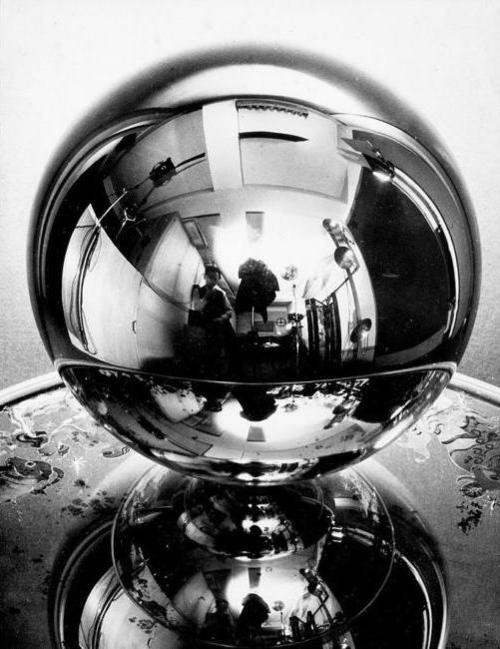PARALLAX NR.3 :
Anamorphosis
In Seminar XI (1973), Lacan invokes the optics of photography as the mechanism of subjectivation. If the subject is instituted in the field vision, Lacan contrasts the subject of consciousness with the subject of desire—the subject who, as he puts it, is photo-graphed: “What determines me at the most profound level, in the visible, is the gaze that is outside. It is through the gaze that I enter light and it is from the gaze that I receive its effects. Hence it comes about that the gaze is the instrument through which light is embodied and through which I am photo-graphed.” On the one hand, the subject of consciousness is the subject who apprehends itself as thought, the subject who “sees itself seeing itself.” This subject is the I/eye—i.e., a “geometral” point within the field of representation. On the other hand, the subject of vision is not simply the subject of reflexive consciousness but the subject of desire. Caught or captured within the field of vision, it is the eccentric subject instituted within the scopic field of the gaze. The specular subject of reflexive self-conscious is thereby displaced by the anamorphic subject of photography. Anamorphosis here refers to a torsion in the field of vision that becomes constitutive of the subject of the gaze. The third session considers a constellations of issues raised by psychoanalysis of the relationship between photography and the unconscious.
Interventions by
Alexi Kukuljevic (Berlin)
Jeff Weber (Leipzig)
Mladen Dolar (Ljubljana)
Samo Tomšič (Berlin/Ljubljana)
Udi Aloni (Berlin)
Hosted by Anne van Leeuwen and Sami Khatib
FACEBOOK EVENT
——————————————————-
TUE 26.07.2014 // ACUD CLUB // 19:00
PARALLAX NR. 4
Copernican Turns and Messianic Displacements
Ever since Kant’s Copernican turn of modern philosophy, the reversal of vision has become a trope of critical thought. Kant turned our subjectiveconstraints of cognition into the enabling conditions of objectiveknowledge. What had been perceived as lack or limitation of human knowledge Kant declared to be constitutive. Taking up this structure, Walter Benjamin’s peculiar sort of historical materialism conceived of a “Copernican revolution in historical perception.” Historical knowledge is constitutively shaped by the historical change of experience of a politicalsubject vis-à-vis its historical object. In his Arcades Project (1927-40),Benjamin gives a messianic-redemptive twist to this shifting constellation. He argues that by virtue of “a displacement of the angle of vision” the “initially excluded, negative component” of historiography can be turned anew into “a positive element,” into “something different from that previously signified […] until the entire past is brought into the present in a historical apocatastasis.” Apocatastasis, a term that is commonly ascribed to the early Christian theologian Origen (185-254 AD), refers to the idea of universal salvation of all souls. For Benjamin, however, apocatastasis here is bound to a structural shift of perspective within historiography, by virtue of which the perception of a past that officially never existed comes to the fore. This shift does not restitute an original condition (i.e. prelapsarian paradise) but restores something that has never existed before. Just as Benjamin’s materialist historian has to “read what was never written,” so the universal salvation of history will also redeem events, which never took place. The idea of a messianic restoration of something, which never happened in the first place, could provide a theological model of how to conceive of the structural change that the displacement of the angle of historical vision brings about in its object. This fourth session investigates how we are to conceive of the re-adjustment of the angle of historical vision in a way that does not limit this shift to the realm of epistemology. Can we think of a shift of the epistemological perspective of the cognizing subject, which initiates and, at the same time, reflects an ontological change in its historical object?
Interventions by
Yanik Avila (Berlin)
Adrian Alecu (Hamburg)
Sami Khatib (Berlin)
Hannes Boeck (Vienna)
Hosted by Anne van Leeuwen
The event will be followed by a closing party at ACUD, starting at 22:00, DJ Kosmik Khatib & JVEA special guests
